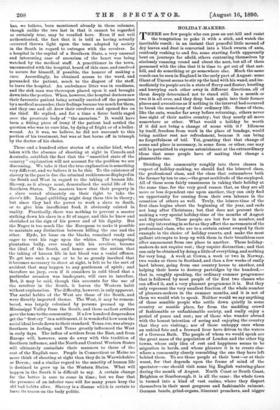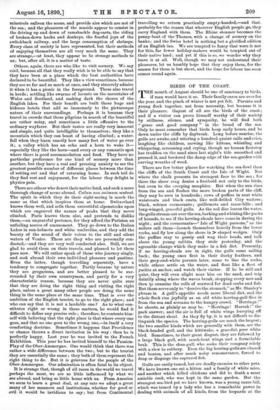HOLIDAY-MAKERS.
THERE are few people who can pass an ant-hill and resist the temptation to poke it with a stick, and watch the inevitable result : in an instant that peaceful little mound of dry leaves and dust is converted into a black swarm of ants, restlessly rushing to and fro, some starting forth apparently bent on journeys far afield, others contenting themselves by aimlessly roaming round and about the nest, but all of them possessed with the idea that it is time to get out of that ant- hill, and do something or go somewhere else. Much the same result can be seen in England in the early part of August: some Giant of Unrest seems to stir up the land with his wand, and im- mediately its people are in a state of flurry and fluster, hustling and hurrying each other away in different directions, all of them deeply determined not to stand still. In a month or two it is all over, and they drop back again into their former places and avocations as if nothing in the interval had occurred to break the monotony of their ordinary life. Some of•them, like the ants, wander far away before returning-; others never lose sight of their native country; but they nearly all move somewhere or other. What would a holiday be worth if it did not bring a change of scene with it P Idleness by itself, freedom from work in the place of bondage, would bring neither rest nor refreshment, because it can bring no forgetfulness of toil. Yet, granting that that change of scene and place is necessary, in some form or other, one may still be permitted to express astonishment at the extraordinary ideas that some people have of making that change a pleasurable one.
Dividing the community roughly into three classes in respect of holiday-making, we should find the leisured class, the professional class, and the class that outnumbers both the former by ten to one,—the great multitude of the employed. All of these seem fairly unanimous in taking their holiday at the same time, for the very good reason that, as they are all more or less dependent one upon another, they can only find an opportunity for ceasing from their own labours in the cessation' of others as well. Truly, the leisure-time of the first class begins about the beginning of the year, and ends not long after Christmas; but that does not prevent their making a very special holiday-time of the months of August and September. These people are but few in number, and are only interesting in so far as they affect the movements of the professional class, who are to a certain extent swayed by their example in the choice of holiday resorts, and make the most gallant attempts to keep up with them in their breathless race after amusement from one place to another. These holiday- makers do not require rest; they require distraction ; and that can only be obtained by doing a little of everything, and nothing for very long. A week at Cowes, a week or two in Norway, two weeks or three in Scotland, and then a few weeks of really hard labour, going from one country house to another, and helping their hosts to destroy partridges by the hundred,— that is, roughly speaking, the ordinary summer programme that is followed by most people of the first two classes who can afford it, and a very pleasant programme it is. But they only represent the very smallest fraction of the whole number of pleasure-seekers in the summer months, and it is not of them we would wish to speak. Neither would we say anything of those sensible people who settle down quietly in some country or seaside place, far from the madding crowd of fashionable or unfashionable society, and really enjoy a period of peace and rest ; nor of those who wander abroad with the honest intention of seeing and enjoying the country that they are visiting ; nor of those unhappy ones whom an unkind fate and a froward liver have driven to the waters of a German Bath. The people of whom we would speak are the great mass of the population of London and the other big towns, whose only idea of rest and happiness seems to be migration in herds, and whose pleasure it is to create else- wfiere a community closely resembling the one they have left behind them. To see these people at their best—or at their worst, for that depends upon the frame of mind of the spectator—one should visit some big English watering-place during the month of August. North Coast or South Coast, Brighton or Scarborough, it is all the same : the whole town is turned into a kind of vast casino, where they disport themselves in their most gorgeous and fashionable raiment. German bands, grind-organs, itinerant preachers, and nigger minstrels enliven the scene, and provide airs which are not of the sea ; and the pleasures of the seaside appear to consist in the driving up and down of ramshackle dog-carts, the riding of broken-down hacks and donkeys, the fearful joys of the switchback railway, and the large consumption of shrimps. Every class of society is here represented, but their methods of enjoying themselves are all very much the same. They are strange,—at least, they appear to be strange methods to us ; but, after all, it is a matter of taste.
Others, again, there are who like to visit scenery. We say visit, because all that they really wish is to be able to say that they have been at a place which the best authorities have declared to be beautiful. They like a view sometimes, because they see so far and so much at once, and they sincerely admire it when it has a picnic in the foreground. These also travel in herds ; settling like swarms of locusts on the mountains of Wales and Scotland, and making dark the shores of the English lakes. For their benefit are built those huge and hideous hotels that add so immensely to the picturesque nature of their surroundings. Perhaps it is because they travel in crowds that these pilgrims in search of the beautiful are rather noisy, and sometimes a little offensive to the ordinary wayfarer. But their tastes are really very innocent and simple, and quite intelligible to themselves ; they like a mountain which they can boast of having climbed ; a water- fall when they learn exactly how many feet of water go over it; a valley which has an echo and a horn to wake it— especially they like the horn—and every or any romantic spot where there is good accommodation and food. They have no particular preference for one kind of scenery more than another, but they have a real and pressing anxiety to see the greatest possible number of different places between the time of setting out and that of returning home. In such toil do they find rest and enjoyment, for the labour they delight in physics pain.
There are others who desert their native land, and seek a more 'thorough change of scene abroad. Ccelunt non animum mutant. The spirit in which they do their sight-seeing is much the same as that which inspires them at home. Switzerland knows them well, and sells them untruthful alpenstocks upon which are engraved the names of peaks that they never climbed. Paris knows them also, and pretends to dislike them,—an ungrateful pretence, for they afford the Parisian an unfailing source of amusement. They go down to the Italian Lakes in sun-helmets and white umbrellas, and they add the beauty of the sound of their voices to the still and silent -waters of Venice. These are they who are personally con- ducted,—and they are very well conducted also. Still, we are glad to avoid them on their travels, and pleased to let them pass now. We will rather speak of those who journey singly, and seek abroad their own individual pleasure and pastime. Even the latter, though travelling separately, have a tendency to congregate together. Partly because by nature they are gregarious, and are better pleased to be sur- rounded by their own countrymen, and partly for a very -characteristic reason, because they are never quite sure that they are doing the right thing and visiting the right place, unless a great many other people are doing the same thing in the same place at the same -time. That is ever the ambition of the English tourist, to go to the right place ; and who.can say that it is not a laudable one ? As to what con- stitutes right or wrong in these matters, he would find it difficult to define any precise rule ; therefore, he contents him- -self with believing that the right place is that where every one goes, and that no one goes to the wrong one,—in itself a very -comforting doctrine. Sometimes it happens that Providence or chance throws a direct invitation in his way : then he is perfectly happy. Last year he was invited to the French Exhibition. This year he has invited himself to the Passion- Play of the Ober-Ammergau. One would think that there was rather a wide difference between the two ; but to the tourist they are essentially the same ; they both of them represent the right thing to do. But it is grievous for the people of the Ober-Ammergau. Our admiration is often fatal to its object.
It is strange that, though of all races in the world we travel ;perhaps the most, we are so little influenced by what we see abroad, and bring so little home with us. From America we seem to learn a great deal, at any rate we adopt a great many of her manners and institutions, whether for good or evil it would be invidious to say ; but from Continental
travelling we return practically empty-handed,—and that, probably for the reason that wherever English people go, they carry England with them. The Rhine steamer becomes the penny-boat of the Thames, with a change of scenery on the banks ; and the Swiss hotel is nothing but a glorified edition of an English inn. We are tempted to fancy that were it not for this, far fewer holiday-makers would be tempted out of their native land ; and yet if this is so, we wonder why they leave it at all. Well, though we may not understand their pleasures, let us humbly hope that they enjoy them, for the season for them is but short, and the time for labour too soon comes round again.



































 Previous page
Previous page